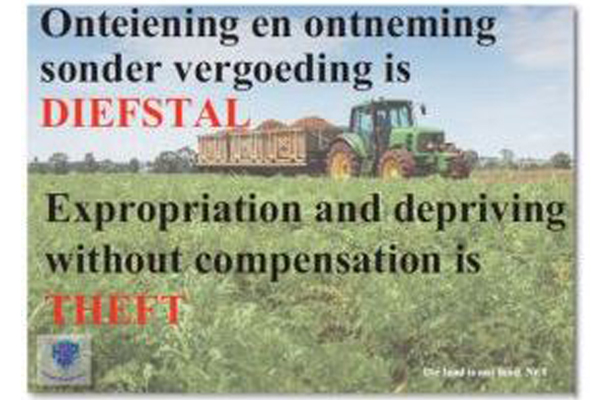29 July 2019 – 05:58 By ERNEST MABUZA
A number of organisations have slammed recommendations made by a presidential advisory panel on land reform.

Image: 123RF/Helen Filatova
Food security will be compromised if the recommendations contained in the report of the presidential advisory panel on land reform and agriculture are implemented to the letter.
This is the reaction of the agricultural industry association Agri SA following the release of the report by the multidisciplinary advisory team on land reform on Sunday. The panel chairperson was Dr Vuyo Mahlati. Panel members were Prof Ruth Hall, Prof Mohammed Karaan, Advocate Tembeka Ngcukaitobi, Bulelwa Mabasa, Dr Thandi Ngcobo, Wandile Sihlobo, Daniel Kriek, Thato Moagi and Nick Serfontein.
The panel was appointed by President Cyril Ramaphosa last year and its report was released on Sunday.
Agri SA said it was extremely concerned about several aspects of the report, particularly the controversial recommendations which include amending the Constitution.
“Agri SA does not support any policy or legislation that infringes on property rights or any other fundamental right enshrined in the constitution.
“If the recommendations contained in this report are implemented to the letter, food security for all South Africans will be compromised,” said Omri van Zyl, Agri SA executive director.
Van Zyl said investor and business confidence were already low, and the last thing the country needed was a further strain on the economy and the agricultural sector.
Agri SA said its president, Dan Kriek, was a member of the panel and that there were fundamental differences in opinion and approach to land reform within the panel.
Kriek and fellow panel member Nick Serfontein had compiled an alternative report with a focus on private sector solutions.
Annelize Crosby, Agri SA policy head on land, said the alternative report identified solutions to land reform, details about which were lacking in many aspects of the panel report.
“We are strongly of the view that land reform in farming areas will take a huge step forward with the establishment of an agricultural development agency where the private sector takes a leading role in driving and financing sustainable land reform,” Crosby said.‘Donations’ of land and tax penalties for large landowners mootedLand expropriation without compensation should be one of several land acquisition strategies for land redistribution.News1 day agoExpropriation without compensation returns to parliament’s agendaExpropriation of land without compensation returns to the parliamentary agenda on Thursday afternoon as the National Assembly is scheduled to revive …Politics4 days ago
Rights group AfriForum said it was going to intensify its campaign against expropriation without compensation at local and international level.
Ernst Roets, deputy CEO of AfriForum, said the report was fundamentally racist because it was a continuation of the assumption that the race of a land owner should be a decisive factor in determining the legitimacy of such ownership.
“The underlying message of the report is that black ownership is good and white ownership is bad. To support this assumption, a selective approach to history and the facts is followed,” Roets said.
He said AfriForum was in favour of redress in cases where injustices
had occurred, but that such a process should entail examining the
specific history of every piece of land and reform.
Agriculture, Land Reform and Rural Development Minister Thoko Didiza,
accompanied by members of the panel, released the report.
Image: SA Gov via Twitter
The Democratic Alliance said it rejected the outcomes of the panel on its position on land expropriation without compensation and other suggestions it made.
“Its suggestions are high risk, and at best promise low reward for those in need of meaningful land reform.”
The DA said it would carefully study the full report with a view to tabling a comprehensive alternative, in keeping with the party’s long-held position on advancing land reform without expropriation.
“If land reform is not approached correctly, the consequences will be disastrous.”
The Agricultural Business Chamber (Agbiz) reiterated its position that it did not support an amendment to the Constitution to allow for expropriation without compensation.
“For South Africa to grow and develop, property rights need to be protected and broadened, not undermined or even rendered worthless,” CEO of Agbiz Dr John Purchase said.
He said Agbiz would study the report and its recommendations in detail and respond according to its mandated policy positions on land reform and agriculture.
The Africa Agri-Initiative (Saai) expressed disappointment with the report.
It said the report was obviously flawed because it was not morally justifiable that individual landowners, who legally bought their properties, should foot the bill of land reform as a national responsibility.
“It avoids any reference to how agricultural financing – as one of the cornerstones of competitive primary production in South Africa – will be affected.
“Every farmer in South Africa runs the risk of losing a farm or two, but the banks can lose all farms that serve as security for their product financing,” the organisation said.

